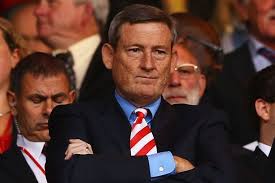By Paul Nicholson
April 30 – Ellis Short (pictured), US billionaire of former Premier League club Sunderland, is selling up and getting out of English football after a ten-year ownership spell that has seem him lose £250 million.
New owners of the club, which next year will play in League 1 after a second successive relegation, are an international consortium led by Stewart Donald, chairman of National League club Eastleigh.
As part of the sale Short is agreeing to write off more than £100 million of debt. It is unclear what the sale price for the club is but it is unlikely that Short.
Last summer Short was in talks with a German investment and is is believed to have put a price of £90 million on his 90% stake, though the Germans only offered £50 million.
The club’s most recent accounts show a debt of about £110 million owed – £69 million to Short and £68 million to Security Bank Capital.
Those accounts showed an after-tax loss of £33 million for the year to 31 July 2016. This is down from a loss of £26.6 million the previous year. In summary information published on the club website, Sunderland said that 2015-16 turnover reached £108 million, an increase of £7 million year-on-year.
Operating profit edged up from £1.1 million to £1.5 million for that year, but with the club committing to gross transfer fees of £38.3 million during the 2016 summer window, player trading/amortisation costs rose to £26.4 million from £20.5 million in 2014-15.
In a statement on the club website Short said: “Overall, my chairmanship has not gone the way I would have wished; the many high points of a decade in the Premier League have been overshadowed by the low points of the last two terrible seasons. I was therefore determined to ensure that I leave Sunderland in the best possible hands and in the best possible state to turn the corner. To achieve this, higher offers from less qualified buyers were rejected, and I have paid off all debts owed by the club to leave it financially strong and debt free for the first time since years before I owned it.”
The deal requires the approval of the English Football League before it can go through.
Donald, who has a background in insurance, does not have the personal wealth of Short, though it is unclear who are in his consortium. He reckons he has spent £10 million on Eastleigh who under-performed this season in the National League after being one of the favourites for promotion to the EFL’s League 2. He will put Eastleigh up for sale.
“All of us involved in this bid believe that Sunderland represents an extraordinary opportunity. Our group have all been involved in building – or re-building – football clubs to reach their potential and we believe that over the last decade we have acquired the necessary skillsets to overcome the many challenges that will face us at this huge club,” said Donald.
“We have a carefully thought-through plan to restructure the club, make it sustainable and, with the help of the fans, to restore its sense of pride and re-connect it with the local community. In short, we are rolling our sleeves up to do what needs to be done to ready this club to start competing again.”
Contact the writer of this story at moc.l1741944854labto1741944854ofdlr1741944854owedi1741944854sni@n1741944854osloh1741944854cin.l1741944854uap1741944854

